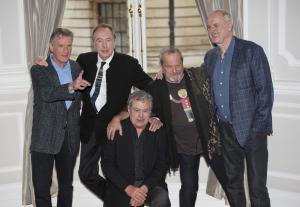In today’s Wall Street Journal “Sightings” column I sound off testily on boomer nostalgia. Here’s an excerpt.
* * *
When the surviving members of the cast of “Monty Python’s Flying Circus,” which originally ran on the BBC between 1969 and 1974, announced plans to give their first public performances as a group since 1982, tickets for the opening-night show sold out in 43.5 seconds. It’s not known whether the comedians will be doing any new material, but I doubt it. That’s not why people come to this kind of event, after all. They come for much the same reason that they came to Broadway in 2005 to see Eric Idle’s musical stage version of “Spamalot”: to applaud their lost youth. Hence they don’t want to see anything new, though they’ll put up with it if absolutely necessary.
 Most “Monty Python” fans are, of course, baby boomers, who have long been a nostalgic lot and are growing more so as they totter toward old age. Witness their tiresomely obsessive fascination with the popular television series of their youth. Likewise their undimmed passion for the rock music of the ’60s and ’70s, which they still love so much that they’ll buy expensive tickets to see wrinkled old codgers play it onstage.
Most “Monty Python” fans are, of course, baby boomers, who have long been a nostalgic lot and are growing more so as they totter toward old age. Witness their tiresomely obsessive fascination with the popular television series of their youth. Likewise their undimmed passion for the rock music of the ’60s and ’70s, which they still love so much that they’ll buy expensive tickets to see wrinkled old codgers play it onstage.
As always with the boomers, this nostalgia contains more than a touch of narcissism. The same narcissism was on display in many of the countless gushy boomer-penned reminiscences occasioned by the fiftieth anniversary of the Kennedy assassination. An indisputably major historical event, to be sure, but there was also something decidedly creepy about the self-centered tone of those suddenly-my-world-changed pieces, which was deftly skewered by this Onion headline: “Area Man Can Remember Exactly Where He Was, What He Was Doing When He Assassinated John F. Kennedy.” Like everything else in the boomers’ world, Kennedy’s death turned out in the end to have been all about them.
I am, as it happens, a baby boomer, but not one who feels any broad-gauge nostalgia for the ’60s and ’70s. My attitude resembles that of my parents, who were born in the ’20s and lived through the Great Depression and World War II. Both of them felt nostalgic about certain aspects of the culture of the ’30s and ’40s, but they never wallowed in it. Theirs was, you might say, a matter-of-fact nostalgia: They’d had too tough a time to feel any other way about their youth….
* * *
Read the whole thing here.
Terry Teachout on the arts in New York City
An ArtsJournal Blog
